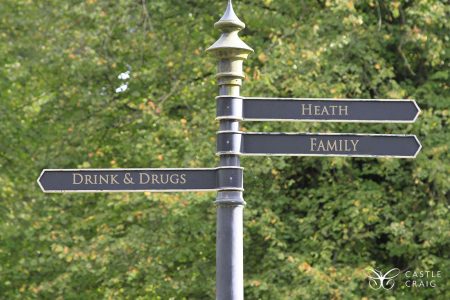There is a well-known relationship between substance misuse and mental illness. At Castle Craig Hospital, we find that about half of people with alcohol or drug problems also have a co-occurring illness. Several factors influence this connection. In many cases, an underlying condition instigates substance misuse. However, substance misuse can also trigger mental illness itself.
Rehab Costs & Options for Alcohol | Drugs | Other addictions
Of course, substance misuse is not the only reason that mental disorders occur. Other underlying causes, such as genetics and environment are also instrumental. Substance misuse, however, can play a key role in a person’s life that influences these, or it can exacerbate the mental illness that may already exist.
How Substance Misuse Can Cause Mental Illness
It is well known that alcohol and certain drugs can cause mental illnes, or trigger a pre-existing psychological condition. For example, someone may not have depression or schizophrenia before they engage in substance misuse. But certain drugs can trigger these conditions, and there is no certain way to tell who is at risk. It may very well be that if they never started using, they would have never developed a problem.
Substance misuse can cause short and long-term changes in the brain, affecting neurotransmitters and hormones. If these hormones become unbalanced, it can set the stage for developing a psychological disorder. Young adults are especially vulnerable, as their brains are still developing. Substance misuse at a young age can cause lasting damage.
There is evidence that depression and schizophrenia are strongly influenced by drug and alcohol use. Certain drugs and alcohol are known to either cause or “activate” psychological disorders. It is unclear, however, exactly why this happens.
One theory is that alcohol and drug use, especially over an extended period, can affect gene expression, which can trigger certain psychological disorders if a person is predisposed to them. In addition, these changes to the body can be passed down to future generations.
Alcohol, Opioids, and Depression
About a third to half of people who misuse alcohol develop depressive symptoms. Studies have shown that chronic alcohol misuse causes changes in brain chemistry and may lead to folate deficiency, both of which are causes of depressive disorder. In addition, heavy alcohol consumption within a short period can mimic symptoms of depression. This can worsen psychological problems if mild symptoms are already present.
Chronic misuse of opioids, such as heroin, has also been associated with the development of moderate or severe depression.
Meth, Cannabis and Schizophrenia
Long-term cannabis use correlates with an increased risk of psychosis, especially if a person is a carrier of specific genes. In addition, cannabis use, especially in adolescence, is linked to a higher risk of developing schizophrenic disorders.
Other studies have shown that methamphetamine misuse may contribute to the development of schizophrenia as well.
Other Drugs
Chronic misuse of other drugs, has also been known to worsen or cause mental illnesses such as depression, anxiety, PTSD, and mood disorders.
For example, if a person was only experiencing mild depressive-like symptoms before, substance use can grow into severe depression.
Certain types of drugs tend to produce particular effects:
- Hallucinogens and psychedelics, such as LSD, and magic mushrooms, are known to trigger or worsen symptoms of personality disorders and schizophrenia
- Sedatives, such as benzodiazepines, can make anxiety difficult to treat
- Stimulants, such as cocaine, meth, or amphetamines, can also worsen anxiety and PTSD. If a person has been abusing stimulants for a long time, a period of abstinence may result in anhedonia, which is a serious symptom of depression
- Long-term use of dissociatives, such as ketamine or PCP, is associated with the development of depression and anxiety
Furthermore, long-term substance misuse can cause changes in lifestyle that result in poor decision-making, which can lead a person into bad situations. Thus, people with substance misuse issues may find themselves in violent or terrifying situations, which can later lead to PTSD, depression and anxiety.
Substance Misuse and Addiction
Substance misuse is not the same as addiction. However, it is important not to forget that addiction is a mental illness as well, and misusing alcohol or drugs can lead to addiction.
Substance Misuse Can Mimic Mental Illness
The effects on the brain and body caused by substance use or the withdrawal process can often mimic the symptoms of mental illness. Professionals refer to these situations as substance-induced mental disorders.
People who come in for substance misuse treatment often exhibit symptoms of a mood or personality disorder. However, these symptoms tend to disappear early on in treatment, after a period of abstinence. In such situations, a person would be diagnosed with a substance-induced problem, instead of a co-occurring mental disorder.
Side effects of substance use and withdrawal can include depression, paranoia, psychosis and hallucinations. At times, these symptoms can persist for long periods, after a person is sober. In such cases, even professionals say it is hard to distinguish what is a co-occurring mental illness and what is caused by drugs or alcohol.
Another example of this is hallucinogen persisting perception disorder, characterised by flashbacks and hallucinations, long after a person has used any drug. This can be mistaken for schizophrenia or other mental disorders.
Dissociatives, especially PCP, are known to trigger psychotic symptoms, which closely resemble schizophrenia.
Meth users can be misdiagnosed with bipolar disorder. From an outsider’s point of view, it appears that they have a period of mania, followed by a period of depression. This is explained by a common behaviour of meth users which involves a binge period, followed by a come-down period. During this come-down, many users self-medicate with alcohol.
Mental Illness May Influence Substance Misuse
In many cases, mental illness that appears due to substance misuse was already present in the person. They may not have been aware of it or never diagnosed.
In the case of depression, some of the first symptoms are feeling lethargic and unmotivated. A person may attribute this to an off week or poor sleep. To alleviate the symptoms, the person may start to self-medicate with stimulants.
While self-medication seems like a good idea and appears to improve the situation, in the end it also worsens it. It may very well be that mild mental illness causes a person to turn to substances. This, in turn, creates a more severe disorder.
Understanding the Connection Between Substance Misuse and Mental Illness
There are many connections between drug and alcohol misuse and mental disorders. Some mental illnesses may have already been present in the person suffering from substance use, while others are influenced by the said substances.
This is why proper treatment for addiction or substance misuse, such as at Castle Craig Hospital, needs to include a dual-diagnosis approach. A person seeking treatment will be evaluated and treated for any psychological disorders, whether they are co-occuring or substance-induced. In the case of addiction, if a mental illness is not treated along with the substance misuse issue, it can lead to lasting negative consequences.



